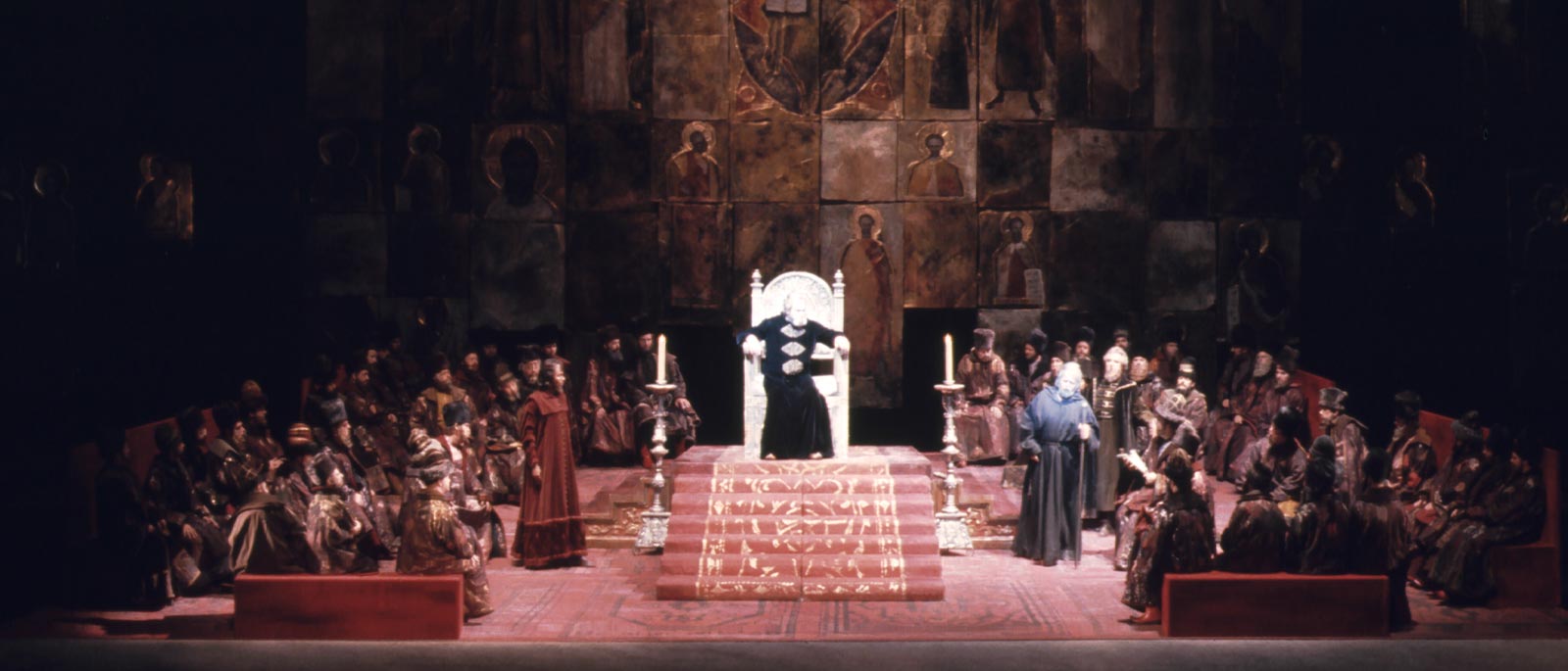
From the Archives: Boris Godunov at the Met
By Peter Clark
Mussorgsky’s epic masterpiece Boris Godunov had its United States premiere at the Metropolitan Opera in 1913, some 40 years after its composition. In spite of the delay, the Met produced a sumptuous introduction to the work with Arturo Toscanini conducting a production originally commissioned by Serge Diaghilev for Paris in 1908. The colorful sets, purchased directly from Paris, were by groundbreaking artists Alexander Golovine and Alexander Benois, and elaborate costumes were by Ivan Bilibine. Polish bass Adamo Didur (pictured below) sang the title role, and the entire performance was given in Italian.
Greeted as a novelty in the Met’s repertory, Boris Godunov had considerable success and was repeated every season through 1929. From 1921 to 1929, the most famous proponent of the title role in the opera’s history, Fyodor Chaliapin (pictured below), sang Boris every season at the Met. “Chaliapin brings something to the opera that is greater than singing, greater than acting. He brings drama, that perfect realization and illusion of life for which singing and acting exist,” wrote the eminent critic of the New York World. The Russian bass’s interpretation of the tortured tsar became, in short, a legend in opera history. While Chaliapin sang Boris in Russian, all the other characters and the chorus kept to Italian.
In the final season of Chaliapin’s Boris performances, a young Italian bass, Ezio Pinza, sang the role of the monk Pimen. Ten years later, Pinza would take the title role when Boris Godunov was revived for the first time since the Chaliapin years. Pinza, who naturally sang in Italian along with the rest of the cast, would remain the Met’s chief interpreter of the title role for the next decade, though he was briefly spelled by Ukrainian bass Alexander Kipnis in 1943.
While the sets and costumes from 1913 had been refreshed in 1938, they were not replaced until 1953 when the opera was given in English with the American bass-baritone George London (pictured above) in the title role. Rather than create an all new production, the Met saved money by re-using scenic elements from recent productions of Khovanshchina and Un Ballo in Maschera. On the musical side, a new orchestration based on Mussorgsky’s original and edited by Karol Rathaus was substituted for the traditional published score by Nikolai Rimsky-Korsakov that had been used up until then. This would be the first attempt in a continuing search to find the ideal orchestration for Mussorgsky’s unfinished opera. In 1960, conductor Erich Leinsdorf chose to use the orchestrations by Dmitri Shostakovich. Over the next two decades, basses Cesare Siepi and Jerome Hines, alternating with London, made their marks in the title role of this production.
A new production in 1975 advertised using Mussorgsky’s original orchestrations, though adaptations were in fact made. For the first time since 1913, Boris Godunov was given a fully new, handsomely realistic production. It was also the first time the Met performed the opera in its original Russian, adding greatly to the authenticity of the performance. Thomas Schippers conducted, August Everding directed, and set designs were by Ming Cho Lee, with costumes by Peter J. Hall. Finnish bass Martti Talvela (pictured above) was a dramatically convincing tsar, especially when, in his death throes, all 6’7” of him collapsed and tumbled down a set of stairs to shocked gasps from the audience.
The Everding production returned at approximately five-year intervals for the next 35 years, with a procession of famous singers in the title role, including Nicolai Ghiaurov, James Morris, Paul Plishka, and Samuel Ramey. Finally, a new production was mounted in 2010, with Valery Gergiev, artistic and general director of St. Petersburg’s Mariinsky Theater, conducting. Stephen Wadsworth directed the staging, with sets by Ferdinand Wögerbauer and costumes by Moidele Beickel, and German bass René Pape joined the Met’s line of famous Boris interpreters.
Peter Clark is the Met’s Director of Archives.